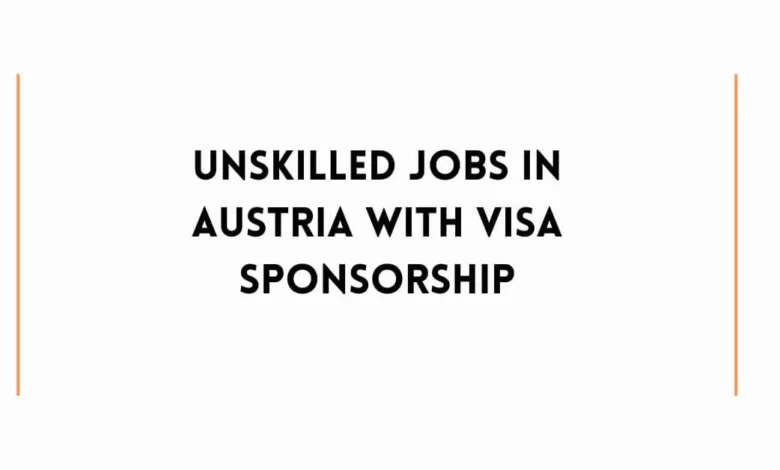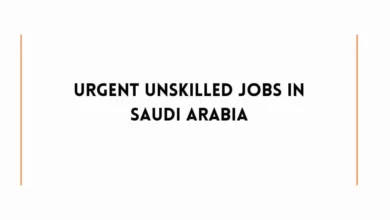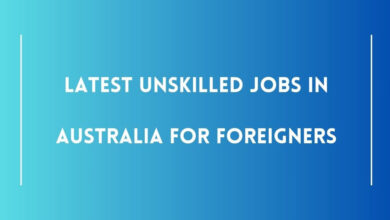Unskilled Jobs in Austria with Visa Sponsorship 2024

The Austrian Job Seeker Visa permits non-European nationals to seek employment in Austria for a period of six months. This visa does not necessitate an Austrian job offer. Request an Austria Job Seeker Visa 2024 in order to travel across the country. The Job Seeker Visa is designed to accommodate individuals seeking employment in Austria without a formal job offer. Applicants from all nations are eligible to participate.
Application for an Austria Job Seeker Visa is so straightforward that even a minor can qualify. The system is point-based. A minimum total of 70 points is required. The requirements for earning these seventy points are straightforward. The application process for the Austria Job Seeker Visa, the points system, the necessary documents, and the application process will be detailed in this article.
Check Also: Unskilled Jobs In Chicago For Foreigners 2024 – Apply Now
Understanding Unskilled Jobs
Defining Unskilled Jobs (H2)
There are numerous types of employment that do not necessitate specialized education or training. These positions frequently require hands-on labor or tasks that can be acquired through practical experience, thereby catering to individuals with limited credentials.
Examples Of Unskilled Jobs (H2)
- Agricultural Laborers
- Construction Workers
- Housekeepers and cleaners
- Retail Assistants
- Warehouse Staff
Visa Sponsorship Advantage
Importance Of Visa Sponsorship (H2)
Sponsorship is a crucial component in the employment process for foreign nationals within Austria. It enables them to legally reside and work in the country, even in positions that may not necessitate extensive training.
Types Of Visa Sponsorship (H2)
- Red-White-Red Card: Skilled Worker
- Red-White-Red Card: Very Highly Qualified Worker
- Rot-Weiß-Rot-Karte Plus: EU Blue Card Holders
- Seasonal Worker Visa
Details About Unskilled Jobs in Austria with Visa Sponsorship
- Job Country: Austria
- Visa type: Job Seeker Visa
- Who can apply? Anyone
- Job offer required: no
Which Other European Countries Offer Job Seeker Visa?
Austria is a European nation-state. Other European countries that grant work-seeker visas are as follows, apart from Austria:
- Portugal Job Seeker Visa 2024
- Germany Job Seeker Visa in 2024
- Sweden Job Seeker Visa 2024
Who Can Apply For Unskilled Jobs In Austria
Job Seeker Visa eligibility is not universal.
- Non-Europeans only may register.
- Austria does not require a work visa from EU citizens.
Eligibility For Unskilled Jobs In Austria
In accordance with the points criterion system, candidates seeking the job seeker visa must earn a minimum of 70 out of a possible 100 points. Eligible candidates must meet the following criteria:
- Graduate as opposed to graduation
- Capabilities and qualifications
- Required credentials and expertise include those in the fields of mathematics, informatics, natural sciences, or technology.
- Ph.D. or postdoctoral expertise active in research and innovation
- Praise for Awards
- Experienced working knowledge
- Possibilities in language
- Age of Austrian Studies
Unskilled Jobs In Austria Points Calculator
For example, you will receive 40 points if you possess a particular skill or experience. You will be awarded 20 points for graduating and another 20 points for being under the age of 35.
The Points Calculator Table is given below.
| Eligibility criteria for very highly qualified persons | Points |
| Special Qualifications and Skills | Maximum allowable points: 40 |
| Graduation from an institution of higher education; the minimum duration of the program: four years | 20 |
| in the subjects of mathematics, informatics, and natural sciences or technology (MINT subjects) | 30 |
| Post-doctoral qualification (habilitation) or PhD | 40 |
| Gross salary of the previous year earned in a senior management position with a company listed on the stock exchange or a company for which the Austrian foreign trade office in charge issued a positive report about its activities or business segment: €50,000 to 60,000; €60,000 to 70,000; more than €70,000 | 202530 |
| Research and innovation activities (patent applications, publications) | 20 |
| Awards (recognized prizes) | 20 |
| Work experience (adequately reflecting the applicant’s qualifications or senior management position) | Maximum allowable points: 20 |
| Work experience (per year) Six months of work experience in Austria | 210 |
| Language skills | Maximum allowable points: 10 |
| German or English language skills for the elementary use of the language on a basic level (A1 level) | 5 |
| German or English language skills for the intensified elementary use of the language (A2 level) | 10 |
| French language skills for the independent use of the language (B1 level) | 5 |
| Spanish language skills for the independent use of the language (B1 level) | 5 |
| Bosnian, Croatian, or Serbian language skills for the independent use of the language (B1 level) | 5 |
| Age | Maximum allowable points: 20 |
| Up to 35 years of age, 40 years of age, and 45 years of age | 201510 |
| Studies in Austria | Maximum allowable points: 10 |
| The second part of the diploma program (Diplomstudium) or half of the required total ECTS points | 5 |
| Completed diploma program (Diplomstudium) or bachelor’s and master’s degree program | 10 |
| Sum total of maximum allowable points: | 100 |
| Required minimum: | 70 |
Visa Validity
The six-month Jobseeker Visa grants the holder legal permission to remain in Austria and pursue employment.
Job Seeker Visa Is Not A Work Permit
Notably, a job seeker visa does not qualify as a work permit. It simply enables you to conduct job searches. A work permit application can be submitted after receiving an offer of employment.
Processing Time
- 3 to 5 months may be required to process your visa application.
Visa Cost
- Jobseeker Visa: € 150
- Red-White-Red Card (This is a work permit):
- Application: € 120
- Granting: € 20
- Costs of personalization (fingerprints, scan of photography, and signature): € 20
Documents Need To Be Submitted For Unskilled Jobs In Austria
The following documents are required with your application for a job seeker visa:
- A valid travel document (passport, for example)
- Photograph (45x35mm) that has not exceeded six months in age
- Documentation proving the presence of locally customary lodging (such as lease contracts, preliminary tenancy agreements, or ownership claims)
- Documentation of health insurance
Unskilled Jobs In Austria Application Form
Application form and criteria data document for the Jobseeker Visa (English)
When, Where, And How To Apply For Unskilled Jobs In Austria
Location to Apply: The Austria Job Seeker Visa (Category D Visa) must be applied for at the Austrian consulate or embassy in your home country.
You can select your country from this link (https://www.bmeia.gv.at/en/embassies-consulates/search-for-austrian-representations) and it will identify the “Representative” Authority for Austria in your home country that is responsible for receiving your application.
Benefits Of Unskilled Jobs In Austria
- Procurement of Employment Opportunities: Unskilled labor frequently presents individuals reentering or entering the workforce with immediate prospects, irrespective of their academic credentials or previous work experience.
- Points of Accessible Entry: These positions ensure inclusivity in the labor market by being accessible to individuals lacking specific certifications or a higher education degree.
- Consistent Employment: Numerous menial occupations, including those in construction, manufacturing, agriculture, and hospitality, provide steady incomes and employment stability.
- Practical Instruction: Although formal training may not be mandatory for these positions, numerous employers provide on-the-job training to acquaint staff with duties, equipment, and safety protocols.
- Wages Competitive with Others: In Austria, wages for menial labor may differ by employer, industry, and geographic location. Nevertheless, numerous employers offer equitable remuneration for these roles.
- Advantages and Perks: Even for unskilled positions, some employers provide benefits including health insurance, retirement plans, paid time off, and incentives.
- Possibilities for Progression: Dedicated and industrious individuals who begin in an unskilled position may have the opportunity to advance within the organization or industry by virtue of their experience and diligence.
- Life-Work Balance: Certain unskilled occupations may provide employees with the opportunity to reconcile work and personal life through flexible work hours or shifts.
- Diverse Places of Employment: Unskilled labor can be found in a multitude of sectors, providing individuals with the opportunity to acquire work experience in a variety of fields.
- Implications for the Economy: These occupations are vital to the Austrian economy, providing support to the workforce and contributing to multiple sectors.
What Happened After You Receive Employment?
Individuals who are in Austria on a Job Seeker Visa and subsequently receive a job offer are eligible to file for the Red-White-Red Card permit.
For further details, please consult the official website and source pertaining to the Austria Job Seeker Visa.
Conclusion
Austria is an excellent destination for those in search of low-skilled employment opportunities; visa funding is an added benefit. Engaging in employment in Austria can offer numerous benefits, including the tranquil mountain scenery and vibrant cultural milieu. An exploration of the various avenues for obtaining a visa and the various types of low-paying jobs can help you begin a new chapter of professional development and self-discovery.
Frequently Asked Questions:
-
Can I get a job easily in Austria?
Job search in Austria Austria’s unemployment rate is one of the lowest in the European Union. Nevertheless, due to the country’s flourishing economy, the number of vacant positions is continually increasing. The chances of quickly finding a good job in Austria are very high.
-
Does Austria need workers?
According to Trading Economics, in September, there were over 218,000 job openings in Austria. The number grew from 84,000 in June and is currently the country’s record.
-
Can you work in Austria without speaking German?
Working in Austria without speaking German can be challenging, but it’s possible in some specific situations. There’re certain job sectors where English may be more commonly used, particularly in international companies, startups, research institutions, hospitality, and some tech-related fields.





